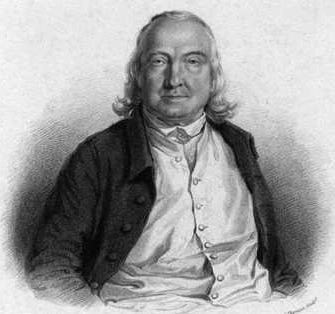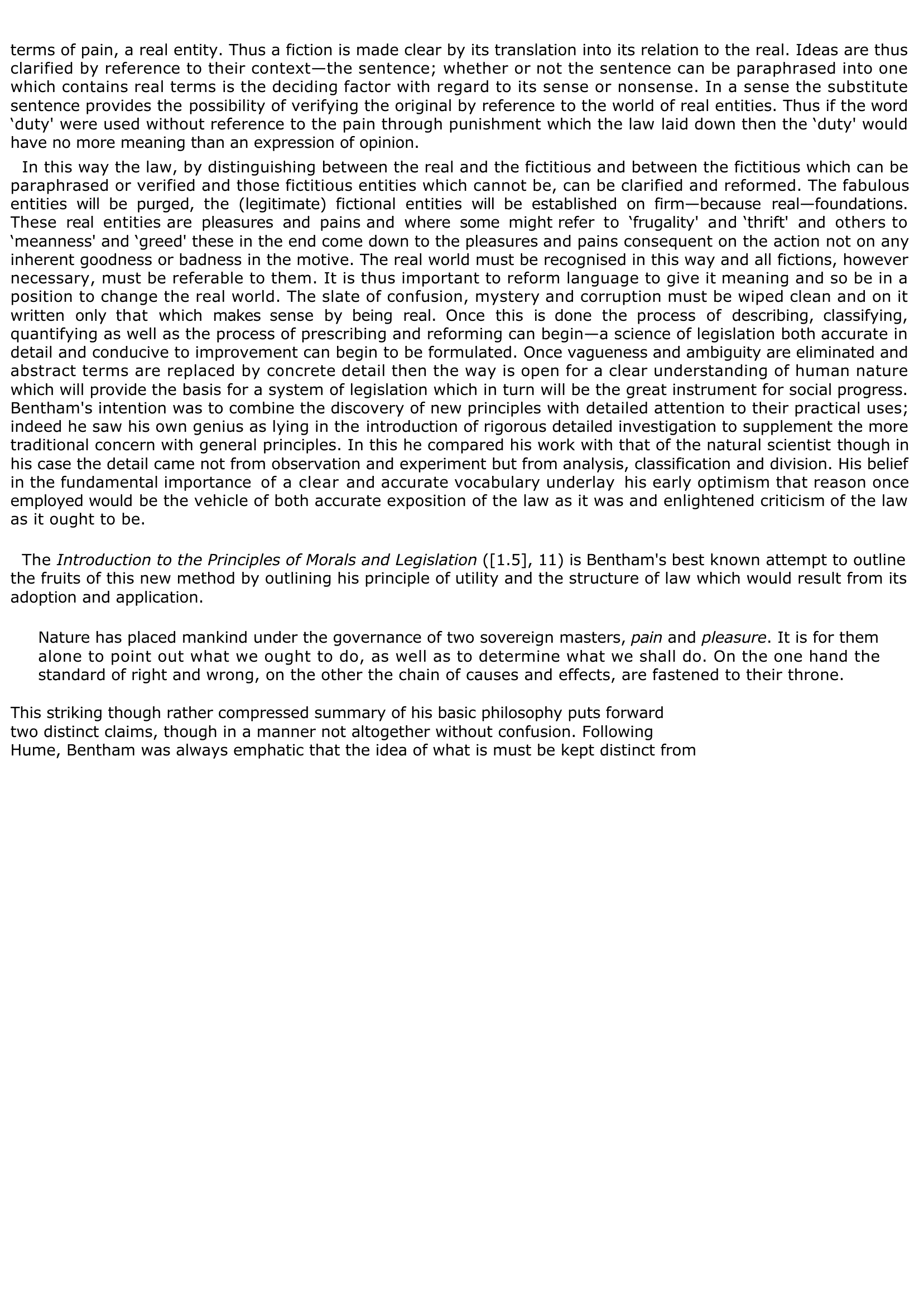Encyclopedia of Philosophy: Bentham and James Mill
Publié le 09/01/2010

Extrait du document

Jeremy Bentham was born in 1748 in London; his prosperous father, a lawyer who became wealthy from property rather than the law, planned out for his son a brilliant legal career. After an early education at Westminster and Oxford he was called to the Bar in 1769. However, instead of mastering the complexities, technicalities, precedents and mysteries of the law in order to carve out a successful career, Bentham’s response to such chaos and absurdity was to challenge the whole structure of law and to attempt to replace it with a system as perfect and as rational as it could be. In many ways a typical philosophe of the eighteenth century, Bentham at this early stage seized on the possibility of improvement through knowledge, on the supremacy of reason over superstition and of order over chaos. Despite his living and writing into the new age of the nineteenth century—post-revolutionary, industrialized, democratic—this early inspiration that enlightenment would bring about a better world never left him. To help create a world as it might be—as it ought to be—rather than succeed in a world as it was—customary, prejudiced and corrupt—was his constant aim whatever the particular object he pursued within his encyclopaedic interests, and whether the study be abstract and philosophical or detailed and practical. His central concern was the study of legislation, a concern developed from his own disillusionment with the state of English law and his positive response to the works of those like Helvetius and Beccaria who had argued that there must be some general and rational test as to the adequacy of existing law in order to justify its reform. As we shall see, this task involved both expository and censorial elements and the principle of utility which Bentham formulated provided the basis of his life’s work.

«
terms of pain, a real entity.
Thus a fiction is made clear by its translation into its relation to the real.
Ideas are thus clarified by reference to their context—the sentence; whether or not the sentence can be paraphrased into one which contains real terms is the deciding factor with regard to its sense or nonsense.
In a sense the substitute sentence provides the possibility of verifying the original by reference to the world of real entities.
Thus if the word ‘duty' were used without reference to the pain through punishment which the law laid down then the ‘duty' would have no more meaning than an expression of opinion.
In this way the law, by distinguishing between the real and the fictitious and between the fictitious which can beparaphrased or verified and those fictitious entities which cannot be, can be clarified and reformed.
The fabulousentities will be purged, the (legitimate) fictional entities will be established on firm—because real—foundations. These real entities are pleasures and pains and where some might refer to ‘frugality' and ‘thrift' and others to ‘meanness' and ‘greed' these in the end come down to the pleasures and pains consequent on the action not on any inherent goodness or badness in the motive.
The real world must be recognised in this way and all fictions, however necessary, must be referable to them.
It is thus important to reform language to give it meaning and so be in a position to change the real world.
The slate of confusion, mystery and corruption must be wiped clean and on it written only that which makes sense by being real.
Once this is done the process of describing, classifying, quantifying as well as the process of prescribing and reforming can begin—a science of legislation both accurate in detail and conducive to improvement can begin to be formulated.
Once vagueness and ambiguity are eliminated and abstract terms are replaced by concrete detail then the way is open for a clear understanding of human nature which will provide the basis for a system of legislation which in turn will be the great instrument for social progress. Bentham's intention was to combine the discovery of new principles with detailed attention to their practical uses; indeed he saw his own genius as lying in the introduction of rigorous detailed investigation to supplement the more traditional concern with general principles.
In this he compared his work with that of the natural scientist though in his case the detail came not from observation and experiment but from analysis, classification and division.
His belief in the fundamental importance of a clear and accurate vocabulary underlay his early optimism that reason once employed would be the vehicle of both accurate exposition of the law as it was and enlightened criticism of the law as it ought to be.
The Introduction to the Principles of Morals and Legislation ([1.5], 11) is Bentham's best known attempt to outline the fruits of this new method by outlining his principle of utility and the structure of law which would result from its adoption and application.
Nature has placed mankind under the governance of two sovereign masters, pain and pleasure .
It is for them alone to point out what we ought to do, as well as to determine what we shall do.
On the one hand the standard of right and wrong, on the other the chain of causes and effects, are fastened to their throne.
This striking though rather compressed summary of his basic philosophy puts forwardtwo distinct claims, though in a manner not altogether without confusion.
FollowingHume, Bentham was always emphatic that the idea of what is must be kept distinct from.
»
↓↓↓ APERÇU DU DOCUMENT ↓↓↓
Liens utiles
- Encyclopedia of Philosophy: HYPOTHESES AND SOCIAL LAWS - COMTE
- Encyclopedia of Philosophy: THE CHARACTER AND ORGANIZATION OF THE SCIENCES - COMTE
- Encyclopedia of Philosophy: J.S.Mill
- Encyclopedia of Philosophy: AL-R-Z/ AND AL-F-R-B/
- Encyclopedia of Philosophy: Jeremy Bentham

































